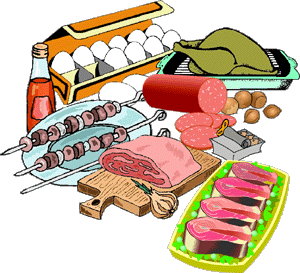I have found that there are a lot of misconceptions out there about how much protein we should be consuming every day as well as what sources best meet this need. When you are continuously bombarded with “eat more protein, eat more protein, EAT MORE PROTEIN” it starts to sink in a bit and you start to think, “hey, I need to eat more protein!” I remember being a freshman in high school and seeing someone else’s poster (some class assignment) that was all about the Atkins Diet (high protein, low carb) and they had before and after pictures of celebrities who had gone on it and YES they were thinner skinnier, but at what expense? They looked older with wrinkles on their face and really boney like you could see the top of their rib cage, and honestly, these women did not need to lose weight to begin with! Well in any case, I was pretty disgusted with the outcome they were showing but somehow after college I started to hear this mantra and it got into my head and I thought, “I needed to eat more protein!” Not once did I look into the research nor the recommendations by organizations that review such research to see what they said about it and instead just bought into the idea (at least for a time and with similar results 😦 ). So how much DO we really need?
A Little History on Protein
I think we can all agree that protein is essential to life, right? Popular thinking about animal protein was established upon the first discovery of the macronutrient protein, back in 1839, where the original Greek name was proteios, meaning “of prime importance.” Since then, protein has been the most important nutrient considered, and the word protein has even become nearly interchangeable with the word “meat.” Ok, so we all agree that we do NEED protein in some amount, but how much?
WHO’s Recommendations
The World Health Organization (WHO) reviews all the research on protein every few years and reassesses their recommendations. WHO’s Recommended Daily Intake (RDA) for protein is 0.83g/kg of body weight, per day, which comes out to be about 8-10% of your calories assuming you are eating sufficient calories (1). This recommended amount for protein covers the needs of 98% of individuals and has been maintained for decades. Just to give you an idea of how much that is, if you weighed 120 lbs, you would need about 45g of protein per day which is about 180 calories, and would be 10% of 1800 calories (assuming you are more sedentary, 1700-1800 calories would likely be sufficient).
Best Food Sources to Meet Protein Requirement
There is a principle that I learned about recently: “There are virtually no nutrients in animal-based foods that are not better provided by plants.” But where and how does one get sufficient protein eating plants, you ask? Let’s look at a more wholistic view of nutrients covered by animal-based foods vs. plant-based foods. If we look at the USDA Nutrient Database and compare a vegetable blend (made up of equal parts tomatoes, spinach, lima beans, peas, and potatoes) and an animal based blend (made up of equal parts beef, pork, turkey, and whole milk), what we find is that per 500 calories, you can see in the chart below that the animal-based blend is higher in cholesterol and fat, with nearly EQUAL THE AMOUNT OF PROTEIN, whereas the plant-based blend is much higher in beta-carotene, fiber, vitamin C, folate, vitamin E, iron, magnesium, and calcium (2).
| Nutrient Composition of Plant-Based and Animal-Based Foods per 500 calories | ||
| Nutrient | Plant-Based Foods* | Animal-Based Foods** |
| Cholesterol (mg) | — | 137 |
| Fat (g) | 4 | 36 |
| Protein (g) | 33 | 34 |
| Beta-Carotene (mcg) | 29,919 | 17 |
| Dietary Fiber (g) | 31 | — |
| Vitamin C (mg) | 293 | 4 |
| Folate | 1168 | 19 |
| Vitamin E (mg_ATE) | 11 | 0.5 |
| Iron (mg) | 20 | 2 |
| Magnesium (mg) | 548 | 51 |
| Calcium (mg) | 545 | 252 |
| *Equal parts tomatoes, spinach, lima beans, peas, potatoes
**Equal parts beef, pork, chicken, whole milk |
||
From this information alone, it is evident that protein is not an issue on a plant based diet as long as sufficient calories and a varied diet are ingested. You can also see that there is more than twice the amount of calcium offered from the plant-based blend than the animal-based blend, contrary to common belief. Cholesterol is only found in animal-based foods and is not necessary to consume in our diet as our bodies are able to produce all the cholesterol we need. Beta carotene and fiber, on the other hand, are only found in plant-based foods and are necessary for us to consume through dietary means.
Wrapping It Up
As you can see, based on the science,
- we really don’t need to be consuming gobs of protein as we often see endorsed in the media.
- we only need about 10% of our calories to come from protein per day.
- it is nearly impossible to have a protein deficiency if you are eating sufficient calories.
- Eating a variety of whole plant-based foods is the best source of protein, more than adequately supplying your daily needs, WHILE adding a nutrient boost to you as well!
What questions do you still have about protein and sources of protein?
- WHO/FAO/UNU Expert Consultation. WHO Technical Report Series 935. Protein and Amino Acid Requirements in Human Nutrition: http://apps.who.int/iris/bitstream/10665/43411/1/WHO_TRS_935_eng.pdf?ua=1, 242-243.
- USDA Nutrient Database: http://ndb.nal.usda.gov/ndb/search/list.


Question: is there any difference in the body between plant protein and animal protein (like how iron is absorbed)?
LikeLiked by 1 person
Good question! There is definitely a difference between how animal and plant proteins are absorbed and used in the body as well as other effects (which I plan on writing more blogs about in the future). Per iron absorption in particular, there is a difference. Those who consume animal proteins are NOT less likely to become anemic but actually more likely than those who don’t. Here is a quote from a well sited article by John McDougall, M.D. on the topic: “Absorption depends upon the acidity of the stomach, the amount of ascorbic acid (vitamin C) in the foods, the kinds of amino acids present, the amount of fiber in the diet, and the form in which the iron is presented (whether heme or non-heme). Ascorbic acid is one of the main enhancers of iron absorption, and fruits and vegetables provide plentiful amounts of this vitamin. All red meats, poultry, and fish are deficient in ascorbic acid. Dairy products are not only deficient in ascorbic acid, they are also very low in iron content, and actually inhibit the absorption of iron present in other foods (for example, calcium and phosphates in milk form insoluble complexes with iron). Coffee and the tannic acid in tea will also decrease absorption of iron from foods… Furthermore, long-term study shows that vegetarians develop no deficiency in iron from their high fiber foods… “Is the amount of iron in vegetable foods (and the absorption characteristics of iron) adequate to meet the needs of people eating little or no meat?” Many studies have looked at this question and consistently the answer is yes. Hemoglobin levels in vegetarians, which reflect the amount of iron in the blood, are comparable to those in people who eat flesh as a large part of their diet; and anemia has actually been found less commonly among people who eat vegetable based diets.”
He also mentions runners anemia in this article. I’m not sure if you’ve heard of this before but since you are a runner, I thought you might like to check this out further. In any case, here is the link to the article: https://www.drmcdougall.com/health/education/health-science/common-health-problems/anemia/
LikeLiked by 1 person